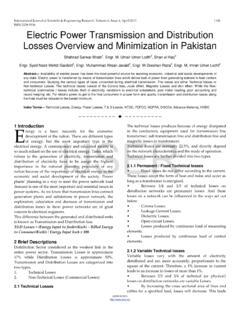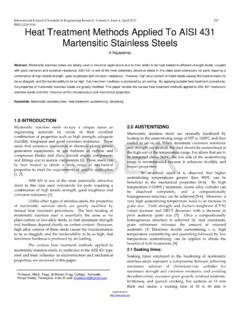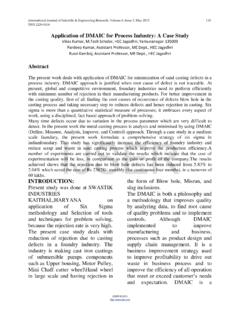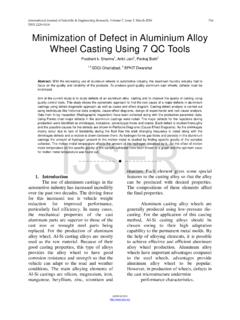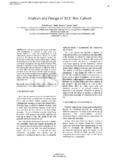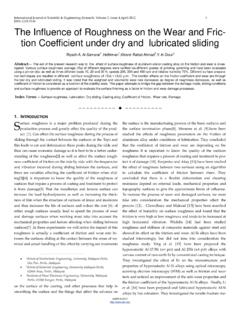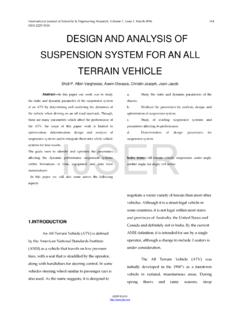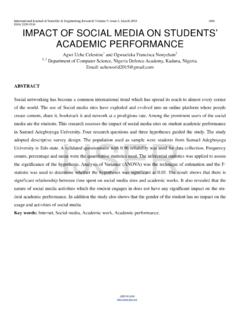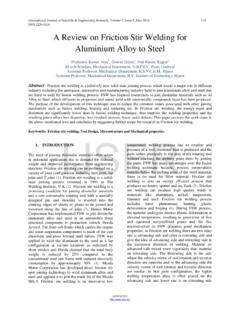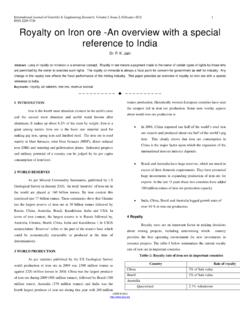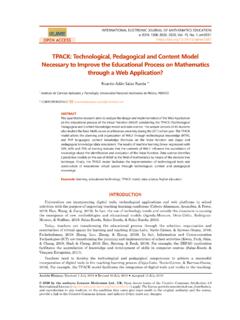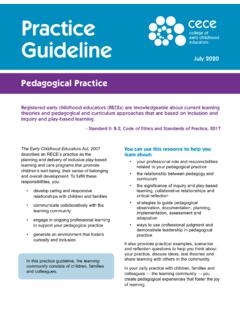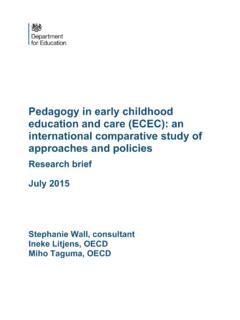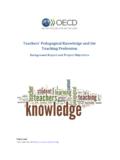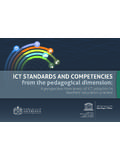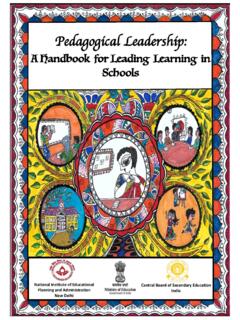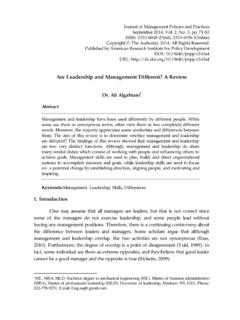Transcription of Pedagogical Theories - IJSER
1 International Journal of Scientific & Engineering Research, Volume 8, Issue 6, June-2017 ISSN 2229-5518 IJSER 2017 TheoriesDickson Kimeli RuttoAbstract - Quality instruction is key to educational processes; it heightens achievement of set objec-tives, aims and goals. The quality of instruction is dependent on pedagogy, thus teachers should em-ploy relevant Pedagogical strategies in their teaching. Pedagogical strategies stem from pedagogicaltheories; therefore each and every teacher should be knowledgeable about these Theories . This articleexplores and gives vital information on Pedagogical Theories . It is aimed at equipping teachers withrelevant Pedagogical terms -pedagogy, theory, Pedagogical theoriesPedagogy: it's a discipline that deals with the theory and practice of education.
2 It concerns withknowledge and skills of : refers to an organized system of accepted knowledge that tries to explain about a phenome-nonPedagogical Theories : these are Theories that postulate how things should be thought, how teachingshould be done and/or how one can be brought to learn. u 1:0 INTRODUCTIONL earning is the core function of schools, irrespec-tive of the type or level. Therefore, teachingshould be at its best always in order to achievethe best standards of learning. This calls forteachers/instructors to be adequately equippedwith Pedagogical knowledge and :1 Theories OF PEDAGOGYAs explained earlier Pedagogical Theories postu-late how teaching should be done in order tobring one to learn.
3 In a practical perspective, thetheories are much related to Pedagogical strate-gies. Pedagogical Theories stem from differentperspectives. This article explores a detailed viewof Pedagogical Theories stemming new London theories1:1:0 HERBATIANISMJ ohann Friederich Herbart (1776-1841) is regard-ed as the father of pedagogy as his works concep-tualized pedagogy. In his theory, he identifiedfive components of pedagogy, as listed below: Preparation; involves getting ready for theinstructional process. Presentation; refers to the actual teachingand learning process. Association; the process of bringing ideasor events together, eg in memory or imag-inations, it can also refer to a mental con-nection or relation between thoughts, feel-ings, ideas, and/or sensations: Generalization;refers to reasoning fromdetailed facts to general principles also canbe explained as formulation of generalconcepts from specific instances.
4 Applications; refers to putting into prac-tice what was effective pedagogy, teachers should incorpo-rate the above components in their teaching andlearning. Herbart also highlighted the relation-ship between an individual's development andits societal impact. His works led to the rise of Dickson Kimeli Rutto, Moi University. Email: Journal of Scientific & Engineering Research, Volume 8, Issue 6, June-2017 ISSN 2229-5518 IJSER 2017 a movement associated with :1:1 THE NEW LONDON GROUPThe new London group (1996), refers to an inter-national consortium of academics researching lit-eracy pedagogies. Their research identified fourmajor components of pedagogy namely: Situated practice Overt instruction Critical framing Transformed practiceSituated practiceDidactic methods of teaching conveys results,products or facts of inquiry to learners withoutengaging them in the processes through whichthey were achieved or even the impact it willhave on their lives.
5 Macleod & Colby (2003), ob-serve that situation practice calls for the model-ing in classrooms of the contexts in which "real-life" learning is achieved. Situation practice takeslearners through the processes that yield the de-sired knowledge. Basically it involves tangibleactivities (projects, practical, etc) and social con-texts of learning (learner interactions).Overt instructionOvert instruction involves construction ofknowledge from what learners already know andalso identifying learner s specific needs for fur-ther framingIt is an aspect of pedagogy where learners standback from what they have learnt and view it crit-ically in relation to its context. Learners are guid-ed to critically analyze and question the ideolo-gies at hand and their relevance.
6 In critical fram-ing, emphasis is placed on practiceThe new London group (1996), explain trans-formed practice as an authentic learning experi-ence where students are both products andtransmitters of literacy learning, including stu-dent-teacher role reversals. Transformed practic-es enables learners put into practice the learnedknowledge and are able to work in a new situa-tion. It helps them develop an ability to act basedon their understanding and apply knowledge ac-quired to solve problems. With transformed prac-tice, learners are provided with opportunitiesthat will help them apply the learned knowledgebeyond the classroom , the four Pedagogical aspects are nei-ther hierarchical nor sequential but can be :1:2 LEARNING THEORIESP edagogical Theories also stem from leaning the-ories.
7 Learning Theories serve as conceptualframework to teaching & learning. The majorlearning Theories are: Behaviorist learning Theories Constructivist learning Theories Cognitive learning theoriesBehaviorist Learning Theories :thesefocus onlearning as an aspect of conditioning as such putemphasis on behavior modification. There arethree types of conditioning as explained conditioning: This is where ante-cedent stimulus is followed by a conse-quence of behavior through reinforcementor punishment. Operant conditioning wasproposed by Burrhus Fredric Skinner(1904 - 1990) commonly referred to as He was an American psychologist& Behaviorist. He did lots of research inhuman behavior, thus developed a con-ceptual analysis of human behavior.
8 Thisapproach considers causes of an actionand its consequences; he referred to it asoperant conditioning. Operant condition-ing deals with intentional actions thathave an effect on the surrounding envi-ronment. In his works, Skinner concludedthat reinforced behavior tends to be re-2026 IJSERI nternational Journal of Scientific & Engineering Research, Volume 8, Issue 6, June-2017 ISSN 2229-5518 IJSER 2017 and vice versa not reinforced tends to dimin-ish/die out. He identified three responsesthat can follow behavior. Neutral operant: these are respons-es from the environment, that nei-ther increase nor decrease the prob-ability of behavior being repeated. Reinforces: these are responsesfrom the environment that increas-es the probability of behavior beingrepeated.
9 Reinforcers can be eitherpositive or rein-forcement strengthens behavior bygiving rewarding consequences toan individual if an instructorgives a learner some amount ofmoney each time he/she scoresmore than seventy percent in classassignments, the learner will bemore likely to repeat this behaviorin the future, hence strengtheningthe behavior of scoring more thanseventy percent in class reinforcement refersto removal of an unpleasant behav-ior in order to strengthen a givenbehavior. For example if a learner issupposed to give out some amountof money for failing to score morethan seventy percent in class as-signments will definitely makethem work hard to score more thanseventy percent to avoid giving outmoney, therefore strengthening thebehavior of working hard.
10 Punisher: these are responses fromthe environment that decrease thelikely hood of a behavior being re-peated. It weakens/eliminates agiven behavior. Generally, a pun-isher acts the opposite of rein-forcement. Disadvantages of pun-ishers Does not guide learners on what todo, but what not to do Can lead to increased aggression, asa way of fighting back Punished behavior is not easily for-gotten and resurfaces when thepunisher is lead tofear fear of conditioning: Ivan Pablov a Rus-sian psychologist (1849-1936) proposed explains behavior as becoming a reflexaction/response to an antecedent learning theory:It is a type of con-ditioning where an observable behavior isfollowed by of Behavioural Learning Theories toPedagogyThe following are the major implications of be-havioral Theories to instruction & pedagogicalstrategies.
